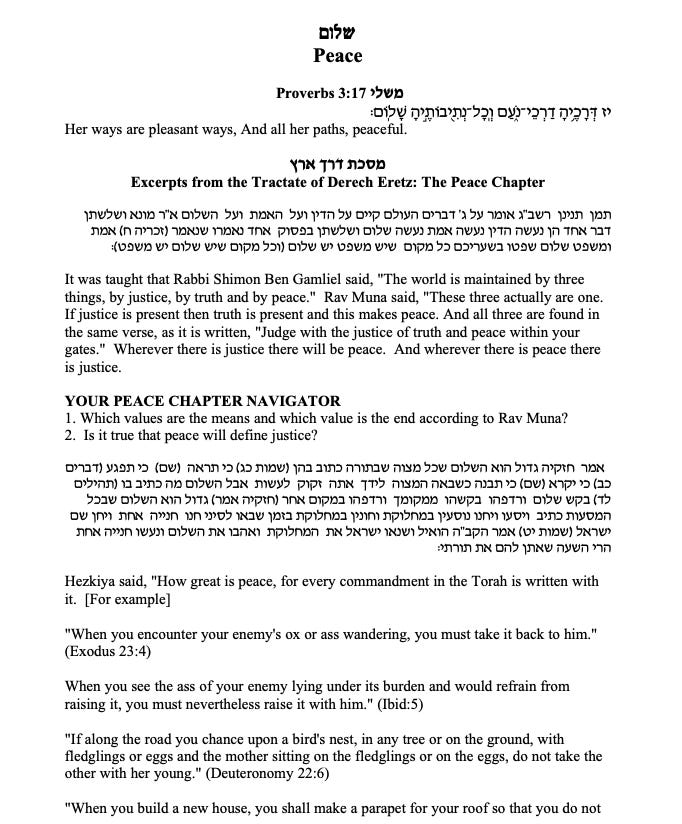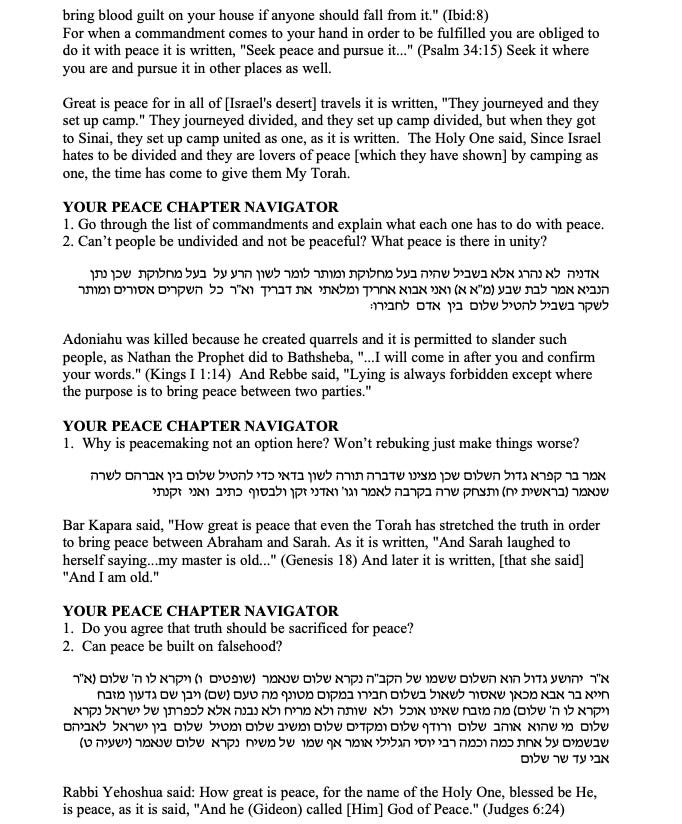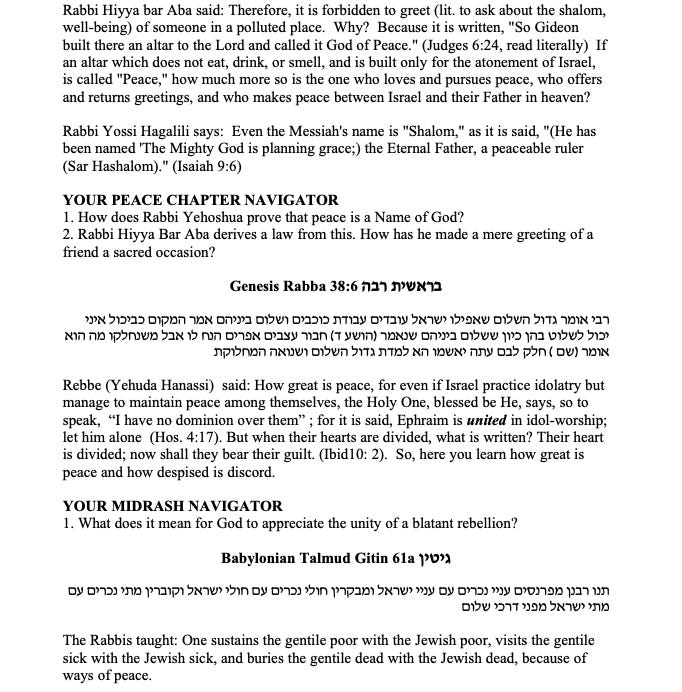About the Mensch•Mark Series
The Talmudic tractate Avot, 6:6 provides a roadmap as to how to live an ethical life. This passage includes 48 middot (measures) through which we can “acquire Torah.” See the full list here. For each of these days of reflection, running from the first of Elul through Yom Kippur, I’m highlighting one of these middot, in order to assist each of us in the process of soul searching (“heshbon ha-nefesh”). Today’s Mensch-Mark is being delivered on Friday, to avoid sending it on Shabbat. Like mannah in the wilderness, there’s a double portion of mensch-marks today for your inbox!
Setting Others on the Path of Peace - Middah Ma'amido al HaShalom
URJ’s Take:
Text
"Hillel says: Be among the disciples of Aaron, loving peace and pursuing peace, loving people and bringing them closer to the Torah." (Avot 1:12)Commentary
Aaron, the brother of Moses, was considered an exemplar of a peacemaker among his people. It is told that when Aaron saw two people at odds with each other, he would approach each one separately, without the other one's knowledge, and say,"Why are you fighting with your friend? He begged me to approach you and arrange a reconciliation." With this tactic, Aaron was able to bring about peace between the two people. (Pirkei Avos Treasury, p. 38)Similarly, if a man and his wife were experiencing marital problems, Aaron would even allow himself to be degraded in order to restore harmony between them. In gratitude, couples whose marriages he had strengthened would often name their next son after him. At Aaron's funeral, there were said to be eighty thousand other "Aarons" that walked behind his casket. (Kallah Rabbasi 3)
The concept of peace (shalom) can refer to intra-personal, interpersonal, and international relationships. Without inner peace, a person is anxious, confused, and hurting. Without communal peace, each person is isolated, separate, and detached. Without global peace, our world will remain in pieces, fractious and fractured. The need for a unified and harmonious whole exists in a person, in a family, in a people, and in all peoples. Shalom is still an unrealized ideal.
Language itself hints at the centrality of peace in Jewish tradition. The word shalom carries a wealth of positive meanings. Referring not only to the absence of war, shalom also means "safety," "wholeness," "completion," "fulfillment," "prosperity,",and "peace of mind and heart.".In English, "peace" is often understood to be the absence of something—a lack of conflict. In Hebrew, shalom is understood to be the presence of something—a sense of well-being and fulfillment. (Artson, It's a Mitzvah, p. 121)
How can Ma'amido al HaShalom (setting others on the path of peace) lead to becoming a Torah-wise person? In a commentary on this middah, it is suggested that by being flexible and ready to compromise when possible, and legitimate, the Torah scholar promotes peace among people (Midrash Shmuel) and increases peace in the world. (Berachos 64a)
My Take: Peace is the highest value
Most know that Shalom means peace, along with hello and goodbye. It comes from the word shalem, meaning wholeness, perfection, fullness, completeness, contentedness. Strong's Concordance adds to that list of definitions: health, peace, welfare, safety soundness, tranquility, prosperity, perfectness, fullness, rest, harmony, the absence of agitation or discord. In modern Hebrew the obviously related word Shalem means to pay for - to “make whole” and complete the transaction. The equivalent cognate in Arabic is salaam, sliem in Maltese, shlama in Syriac-Assyrian and sälam in Ethiopian Semitic languages from the Proto-Semitic root S-L-M. Shalom is also a name of God, a common name for males, and a name of a heck of lot of synagogues. Jews are big fans of shalom.
Darchay Shalom are “ways or peace” and Shalom Bayit, a prime Jewish value unto itself, means “peace in the home.”
As quoted on MyJewishLearning’s site, according to Rabbi Simeon ben Gamliel, three things preserve the world: truth, justice, and peace (Avot 1:18). Peace, however, seems to take precedence even over truth, as the Talmud permits deviation from truth in order to establish peace. In addition, there is a whole category of rabbinic ordinances established called mipnei darkhei shalom, in the interest of peace. For example, the Talmud says that Jews are to provide sustenance for non-Jewish poor people mipnei darkhei shalom.
The mezuzah is a symbol of our deep desire for the home to be a place where Godliness dwells, in particular in the interactions between spouses and between parents and children. Clearly our society has a long way to go in this area. As Naomi Graetz has written in this summary of Jewish legal views on this topic:
“For many years there has been a myth that domestic violence among Jewish families was infrequent. However, there is much data demonstrating that domestic abuse is a significant and under-recognized behavior in Jewish communities in Israel and the Diaspora. Jewish women typically take a longer time to leave abusive relationships for fear that they will lose their children and because they are aware of the difficulties in obtaining a get, a Jewish divorce document” (Find a more detailed article by Graetz here).
See below a collection from midrash extolling the supreme value of peace.





No comments:
Post a Comment